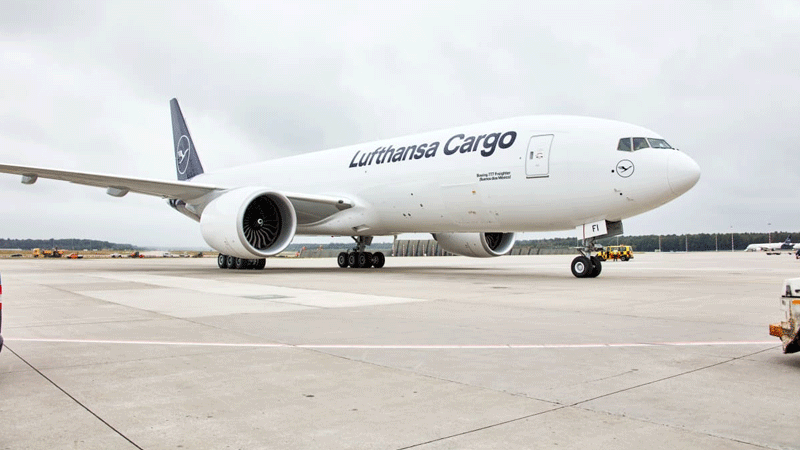Kintetsu World Express will reduce around five percent of its total CO2footprint of transported airfreight with Lufthansa Cargo for one year. Kintetsu World Express has committed to using Sustainable Aviation Fuel in the period from October 2022 to September 2023. In addition, the company has decided to offset the so-called well-to-tank emissions generated during the production and provision of Sustainable Aviation Fuel with the help of certified climate protection projects.
“Climate change is getting more and more obvious and devastating everywhere in the world. As an asset-light freight forwarder, reducing our Scope 3 greenhouse gas emissions is key to winning the battle against global warming. And SAF is a rising star. Recently, in our initial response to the recommendations of The Task Force on Climate-related Financial Disclosures (TCFD), we declared our intention to actively participate in our partner airlines’ SAF programs. I am delighted and proud to work with our long-time partner Lufthansa Cargo for the sustainable future of the air cargo industry”, states Nobutoshi Torii, President & Chief Executive Officer of Kintetsu World Express.
“We are very proud that we have been able to win Kintetsu World Express, one of our most important customers, to transport their freight with us on a CO2-neutral basis,” says Dorothea von Boxberg, Chief Executive Officer of Lufthansa Cargo AG. “Already today, Sustainable Aviation Fuel offers the opportunity to save around 80 percent of emissions in airfreight transport. That's why every customer who takes advantage of this opportunity makes a decisive contribution to advancing decarbonization in logistics. Thanks to the commitment of Kintetsu World Express and our other customers who have chosen Sustainable Aviation Fuel, we have already been able to replace around two percent of our annual fossil fuel requirements with Sustainable Aviation Fuel in 2022.”
The overarching term for sustainable, biogenic or synthetic kerosene is "Sustainable Aviation Fuel" (SAF). SAF is considered to be the first real alternative to fossil aviation fuel. Currently it is mainly produced from biomass. In the future, "non-biogenic" fuels will also be available; the best-known example is the so-called Power-to-Liquid (PtL) concept based on renewable electricity, water and CO2. SAF enables an almost closed CO2 cycle: While fossil fuels release CO2 that has been bound for millions of years and the current level of CO2 in the atmosphere is increasing, the use of SAF in the combustion process releases only as much CO2as was bound immediately before in the manufacturing process.
Sustainable Aviation Fuel is the key to CO2-neutral air traffic and can be fed into regular flight operations without infrastructure adjustments. There are different production processes and different feedstock materials for SAF. The SAF currently used by Lufthansa Cargo is produced in the HEFA process (Hydroprocessed Esters & Fatty Acids) from biogenic residual materials, for example from used cooking oils. It does not conflict with food cultivation, as only forestry, agricultural or gastronomical waste is used. Lufthansa Cargo offers SAF via the Lufthansa Group from the world's leading SAF manufacturers. Since September 2021, all Lufthansa Cargo customers have been able to have their freight transported in a CO?-neutral manner by opting for the Sustainable Choice add-on service.
In addition to using Sustainable Aviation Fuel, Kintetsu World Express relies on additional offsetting of greenhouse gases generated in the provision of SAF. Lufthansa Cargo offers its customers a selection of ten carbon offset projects curated by the Lufthansa Group from the non-profit organization myclimate, which applies only the strictest, independent quality standards such as Gold Standard and Plan Vivo when selecting and designing carbon offset projects. With the help of the high-quality offset projects, fossil energy sources are replaced by renewable energy or energy-efficient technologies. Another option is to protect endangered forests, whose trees extract CO2 from the atmosphere over their lifetime, convert it and store it as carbon. The amount of emissions saved from the projects is calculated and can be passed on to companies in the form of emission reduction credits - so-called certificates - in quantities appropriate to their needs. On the basis of the certified CO2 savings or reductions, it is therefore possible to offset CO2 emissions that arise, for example, in the course of freight transport. Another advantage is that the compensation mechanism via high-quality projects not only involves climate protection measures that demonstrably save CO2, but the projects also always bring local benefits for the population and the environment. Jobs are created, infrastructures improved or health risks reduced, biodiversity protected or educational opportunities improved.









